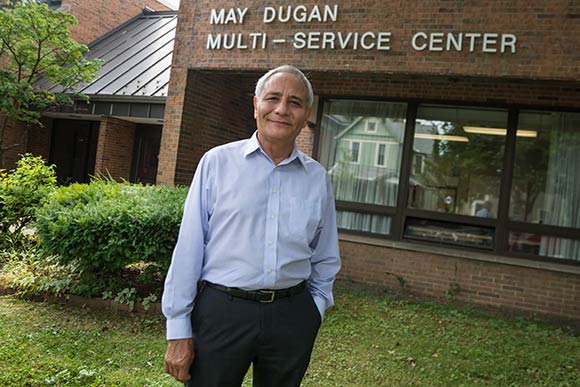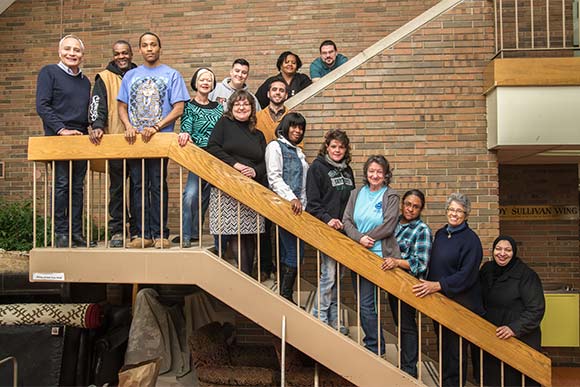Q & A: Rick Kemm
Rick Kemm is the kind of guy you might spend an hour chatting and laughing with before you realize where the time went. But amid anecdotes and smiles, the executive director of the May Dugan Center is sure to convey the community’s needs and why he’s the one capable of catalyzing change.
Decades ago when he became a manager at the American Red Cross in Cleveland, an area resident confronted Kemm, angry that he had been chosen for the job as opposed to a Puerto Rican. Kemm didn’t back down.
“I said, in Spanish, ‘listen, the problems of the Puerto Rican community are no different than the problems in the Chicano community. It all revolves around education, housing, employment. All those issues are the same, and I can represent your community,’” Kemm recalls.
But in true Rick Kemm fashion, he ended up befriending the man.
“I just saw him last weekend, actually,” he says.
Kemm has been working in Cleveland’s nonprofit sector for about 30 years for the likes of United Way, Eliza Bryant Village and others. He sat down with Freshwater Cleveland contributor Brandon Baker to discuss his passion for health and human services, how he wound up in Cleveland and what’s next for the May Dugan Center.
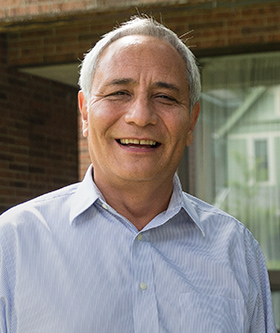 Rick KemmYou've been at this a long time. What are your earliest memories of wanting to give back?
Rick KemmYou've been at this a long time. What are your earliest memories of wanting to give back?
I grew up in Denver, Colorado, in a working class family. My parents were not very wealthy - I grew up in a predominantly Chicano neighborhood in the west side of Denver, but my parents worked very hard to send my sisters and me to parochial schools. I did a lot of volunteer work, even back in grade school. I worked very closely with the nuns, and you learn through quality Catholic education about helping the poor. So I remember a lot of my evening time and weekend time volunteering to do different projects within the community I grew up in. A lot of it was based on the principle of helping the poor. Education has always been an important thing to me. Particularly when it comes to low-income people because you’re not going to be successful unless you have some good education, even basic education.
Was there a point when you realized that you would make helping others a lifelong career?
My mom always says, ‘honey, why didn’t you become a doctor or an attorney?’ I say, ‘I’m blaming you because you got me involved through Catholic schools to care about my community’ [laughs]. When I got my undergrad degree, I went right into the nonprofit sector.
Then I got a job in my neighborhood. I was the director of the Brothers Redevelopment Home Counseling Center. We helped over 400 low-income families - mostly Latino families - become first-time homebuyers. I loved that job, but I knew I wanted to get an advanced degree. Then I applied for a scholarship with the National Urban Fellows program, and I got accepted. That’s what brought me to Cleveland. I switched to Case Western Reserve University to get my masters. September 4th will mark 30 years that I’ve been in Cleveland.
I knew then that I was in for a long career in the nonprofit sector. My long-term goal was to become an executive director ... [After working at American Red Cross, United Way of Greater Cleveland and Eliza Bryant Village] I got wind of this position [at May Dugan] and accepted a couple of days before President Obama was elected. There was a week between Eliza Bryant and starting here, and I got a call from the board asking, ‘would you be able to join us for a finance committee meeting? We know you haven’t started yet, but … ,’ and that’s when I caught wind of just how hard the recession had hit us. We had just received notification that we were losing over $200,000 in funding. I said to myself, ‘what am I getting myself into?’ I earned my gray hair - let me tell you. It was scary.
Did you consider, even for a second, that you shouldn’t do this?
I keep finding stuff in some of my old folders - little notes I would write to myself. I would ask myself, ‘why did I do this? How am I going to get May Dugan out of this bind?’ I was worried that we weren’t going to be able to make payroll. We’ve had to dip into our endowment a few times. Even now, we’re still not where we should be, but a lot of my colleagues who run agencies are feeling the same way. It’s not just May Dugan.
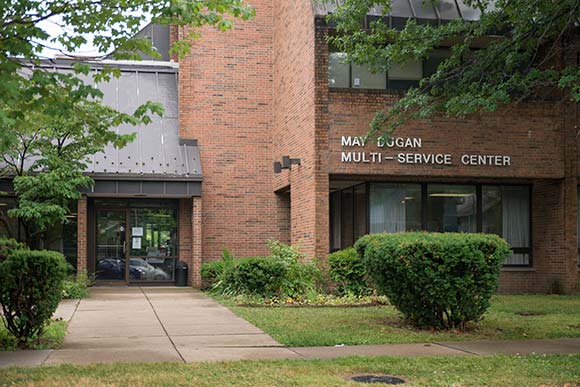 The May Dugan Center
The May Dugan Center
What was the key to overcoming the most difficult challenges? Why did you stick with it?
I felt like this was a calling for me. This was meant to happen. I love everything about what’s happening in Ohio City, Detroit Shoreway and Tremont. Even though I’ve had some rough experiences, I really feel there’s a purpose for me to be here. It’s to help sustain this agency.
What's exciting about the Center these days?
We’ve finally made headway on finding a tenant to help us come to full capacity in the building. I’m reluctant to say which tenant until we have a signed lease because I don’t want to jinx it.
One of the other things I want to see is [the Center] having a very successful 50th anniversary. We turned 47 this past July. I want to see the May Dugan Center buy this building [note: the property is owned by the City of Cleveland]. We know how much money we need to raise - $3 million to get this building up to par for the next 20 years … Our chances of generating new revenue for building improvements are going to be greater if we own the building. If the city owns it, then the city’s going to have to raise the money. We know darn well they’re not going to do that for us.
You have to go back to the purpose of why this building was built when President Lyndon B. Johnson launched the War on Poverty. One of his first initiatives was to launch a request for proposal (RFP) from cities that had large pockets of poverty to build multi-service centers so that low-income people can come to one location for multiple services.
It gives me goose bumps to know that we have been true blue to that RFP. We have stuck with it, and we’re still here. The city needs to remember that. We’ve been an anchor on this corner of Randall and Bridge for decades.
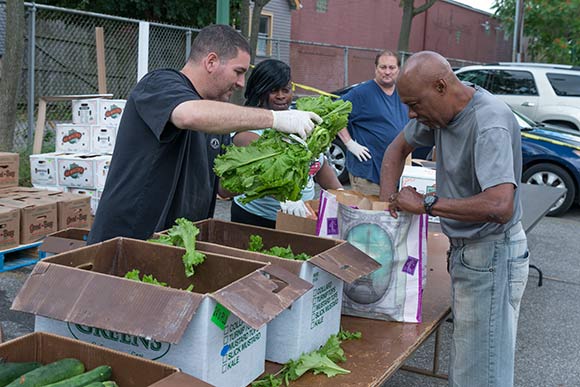 Weekly fresh produce distribution at The May Dugan Center
Weekly fresh produce distribution at The May Dugan Center
What our your proudest accomplishments during your years at May Dugan?
During the recession there were so many people who were coming here, and it just broke your heart to hear the stories. They lost their jobs or were unemployed, but they didn’t want to depend on unemployment or government assistance. These were low-income individuals who … wanted to pull themselves up and be successful. I went to talk to my former director of counseling: ‘I don’t get this: if we have 50 new cases looking for employment, why isn’t anyone seeing them and why aren’t we billing for the time we spend with them? Why aren’t we accredited so that we can become certified through the state Department of Mental Health and Addiction Services and bill for our eligible units of services?’ The board gave me their blessing, but it was contingent upon raising funds to pay for any unanticipated expenses. That was a huge accomplishment. We received our three-year accreditation [through the Commission on Accreditation of Rehabilitation Facilities] two years ago. We generated revenue.
At the same time … we had a lot of people looking for employment who didn’t have a high school diploma or a GED. I went back to the program committee and said there is no reason why May Dugan shouldn’t have their own education resource center … I could envision our own education center helping people get their GEDS, education for speakers of other languages, improve their English and basic literacy. They said, again, it’s contingent upon raising money. We raised nearly $100,000 from a variety of funders and individuals, and we built out that state-of-the-art Education and Resource Center. We have been averaging close to the 300 people a year. We have four wonderful instructors, dedicated volunteers. We placed nearly 100 people in jobs last year. That is huge. May Dugan wasn’t doing that before.
I also take great pride in surrounding myself with some really great leadership. My management team, I love them, and if you don’t have a good management team to work with, you’re not going to be successful. We make things happen.
What do you think would make the late May Dugan happiest regarding what you and your team have done?
We’ve been able to continue her legacy. We still, to this day, provide the basic services that she started: food, clothing, she helped people find jobs. We’ve advanced it. Not only what she did back in the ‘20s, ‘30s, ‘40s and ‘50s, but we’ve been able to build on her ideas and be creative and do more. We have a health and wellness program, we have a senior wellness program. We have the Education Resource Center. She would be proud. I often say May Dugan is watching over us when something good happens.
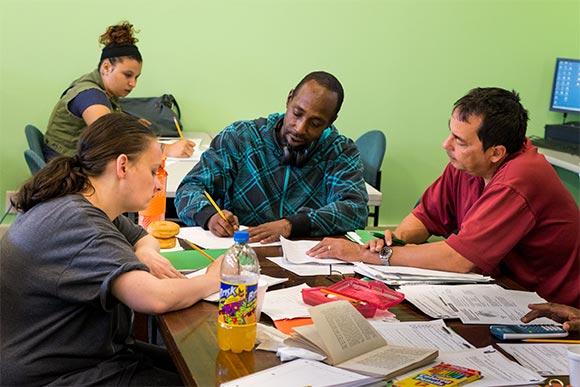 May Dugan Community Education Classes
May Dugan Community Education Classes
As her family members told us some months ago, we do know that she could be tough, so what’s something she would tell you to work on?
Raising more money [laughs]. She would want me to figure out how to raise more money, bottom line. She probably would help me figure out how to do it, and continue to build on what we have. We just signed another [Memorandum of Understanding] with the Cleveland Rape Crisis Center, then we have St. Herman’s, West Side Catholic Center, Cogswell Hall, Neighborhood Family Practice. We didn’t have that in place before. She’d want us to continue to expand our programming and build more partnerships. We’ve done a damn good job at that.
Kemm's answers have been lightly edited for readability.
This story is one of a Fresh Water series supported in part by the May Dugan Center.
.jpg)

